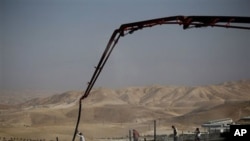The Middle East peace talks remain at a standstill as Israel considers a U.S. plan to extend a freeze on West Bank settlements in exchange for a number of incentives, including a squadron of advanced American warplanes.
The U.S. Department of State says the Obama administration is working intensively with the Israelis and Palestinians in order to move toward negotiations on all final status issues. Spokesman P.J. Crowley says the U.S. will do all it can to create conditions for both sides to have confidence to return to the talks.
"Our efforts are to get both parties back into direct negotiations as soon as possible," Crowley said. "We are engaged with the Israelis. We have engaged with the Palestinians."
Crowley says the U.S. message to the Israelis and Palestinians is the same, "get back to direct negotiations, work through the core issues; and get to a just, fair and equitable settlement within 12 months."
|
Elliott Abrams speaks with VOA's Susan Yackee:
|
Elliott Abrams, senior fellow for Middle Eastern Studies at the Council on Foreign Relations, told VOA it is unlikely the 2011 deadline suggested by the Obama administration will be met by the Israelis and Palestinians.
"They have been negotiating for a very long time and they have not been able to overcome the differences on some critical issues like Jerusalem or security arrangements," said the former foreign policy advisor to U.S. Presidents Ronald Reagan and George W. Bush. "It may be too optimistic to expect the Israelis and Palestinians to come to an agreement by 2011 on all issues which separate them when they have not yet started negotiations."
Abrams told VOA he opposes the U.S. plan to provide American warplanes to Israel in exchange for an extended freeze on West Bank settlements even though he is not opposed to military aid to Israel.
"It is the linkage." he says. "The Israeli agreement to extend their construction freeze in the West Bank by 90 days is now linked to a squadron of jets and to U.S. vetoes in the U.N. Security Council."
Abrams believes neither of these linkages should be connected with the issue of a West Bank construction freeze by the Israelis. He said the U.S. should be making decisions in the Security Council on the basis of principle.
"If it is a bad resolution we should veto it," the Middle East scholar says. "Similiarly the U.S. should give Israel what it needs, but it should not be linked to a 90 day extension of the freeze."
VOA asked Abrams if he thinks the U.S. will offer the Palestinians something to counter its offer to the Israelis.
"We in the U.S. are in favor of establishing a Palestinian state," he says, "and they (Palestinians) would be the main beneficiary of returning to the negotiating table, yet they are the one refusing to go to the negotiating table."
Palestinian President Mahmoud Abbas has said he opposes a return to peace negotiations until Israel halts all settlement building on the land where the Palestinians aim to found their state.
Israeli Prime Minister Benjamin Netanyahu has so far resisted calls to freeze settlement construction. Restrictions he imposed for 10 months on West Bank settlement building expired in late September.
Some information for this report was provided by AP and Reuters.




